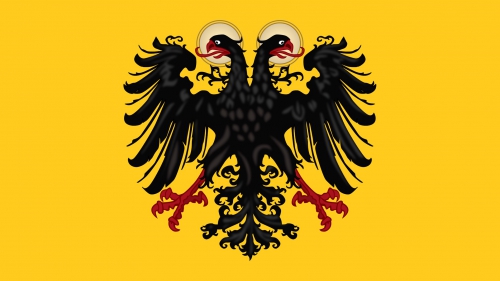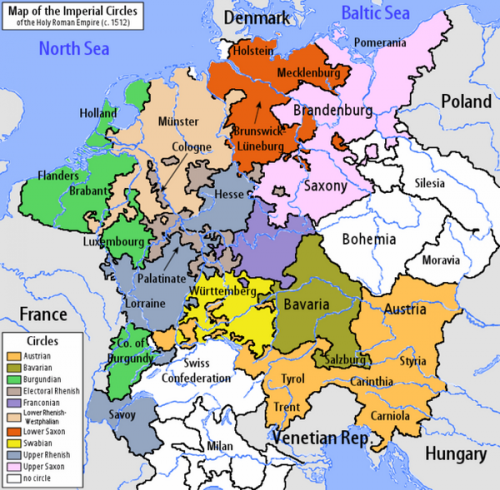samedi, 23 janvier 2016
The Holy Roman Empire can help inspire a different European Union

The Holy Roman Empire can help inspire a different European Union
Peter Wilson
Ex: http://www.ft.com
We should look to the example of Charlemagne, writes Peter Wilson
Germany’s past casts a long shadow. Last summer, Greeks protesting against the stringent terms of the EU bailout brandished pictures of Angela Merkel sporting a Hitler moustache and a Nazi armband, with the swastika replaced by the euro sign.
Such images remain potent but they hinder real engagement with the questions of how Germany will use its current economic and political influence, and how far the EU can or should contain that power. For answers we should look back in time to when Germany was part of the Holy Roman Empire.
The empire scarcely seems worthy of discussion today. If it has any resonance at all, it is usually thanks to Voltaire’s quip that it was “neither holy, Roman nor an empire”. Founded by Charlemagne on Christmas Day 800, the empire appeared to go into decline almost immediately until being swept away as an obsolete irrelevance by Napoleon in 1806. In the words of James Madison, the fourth president of the US, the empire was “a nerveless body; incapable of regulating its own members; insecure against external dangers and agitated with unceasing fermentations in its own bowels.”
Knowing why the empire has been interpreted this way can help us to understand present-day Germany’s position in Europe, particularly its leading role within the EU.
The legacy of two world wars has encouraged those outside Germany to fear its leadership as potential hegemony but the history of the Holy Roman Empire reveals a time when Germany was part of a wider pacific order.
The negative interpretation of the empire rests on seeing it as a series of failed attempts to create a German nation state. In this version of history, a succession of monarchs tried to create central institutions capable of imposing a uniform system of rule, only to be thwarted by the selfish ambitions of petty German princes.
In fact, the empire was never simply “Germany”. It covered what is now Austria, Switzerland, Belgium, Luxembourg, Netherlands, the Czech Republic, much of Italy, and parts of France and Poland.
Historians in all these countries found no use for the empire when they came to write their national stories in the 19th century. For them, like the Greek protesters, “empire” meant foreign domination.
"Power was always multiple and plural. The management of daily life was devolved to more local

The imperial aspect of the empire is perhaps the hardest for us to grasp today, largely because we tend to conceive empire through the experience of European colonial power.
We expect empires to have a clear and stable core inhabited by an imperial people that imposes its will on peripheral regions. But the Holy Roman Empire had no core, because it never possessed a clear centre of government or even an official capital. Instead, power was always multiple and plural. The management of daily life was devolved to more local powers.
The most significant change across the centuries was not a progressive fragmentation of an originally centralised power, as previous generations of historians believed.
Rather, it was a gradual thickening of local power that drew its legitimacy from its relationship to the empire as a whole. Imperial charters and laws sanctioned local rights and liberties.
Additional layers were added over time in response to circumstances, most notably during the 16th and 17th centuries, when Protestants acquired the same legal safeguards as Roman Catholics.
"Its inhabitants generally identified with it positively because it preserved their own autonomy and ways of life"
However, long before this Jews had received protective rights which generally functioned better than those granted by monarchs in Europe’s more centralised kingdoms.
And it is here that we see most clearly what the empire can tell us about Europe’s possible future. Its inhabitants generally identified with it positively because it preserved their own autonomy and ways of life.
It cannot be a blueprint for today’s EU, because the social order which underpinned that local autonomy was also riddled with inequalities we would find abhorrent.
Yet it does suggest an alternative to the stark choice between the EU as a single, homogeneous superstate or fatally weakening Europe’s global position by fragmenting it into a mosaic of national states.
The writer is Chichele professor of the history of war at the University of Oxford and the author of The Holy Roman Empire
00:05 Publié dans Histoire | Lien permanent | Commentaires (0) | Tags : histoire, europe, allemagne, saint-empire, saint-empire romain de la nation germanique |  |
|  del.icio.us |
del.icio.us |  |
|  Digg |
Digg | ![]() Facebook
Facebook



Les commentaires sont fermés.